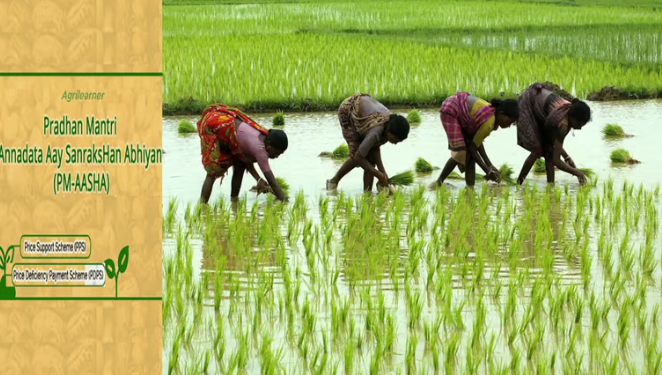Cabinet Approves Extension of PM-AASHA Schemes for Farmers (GS Paper 2, Government Policies)

Context
- The Union Cabinet has recently approved the extension of the PM-AASHA (Pradhan Mantri Annadata Aay Sanrakshan Abhiyan) schemes, which are designed to ensure fair pricing for farmers and manage price volatility of essential commodities.
- This initiative aims to provide guaranteed Minimum Support Prices (MSP) for agricultural produce, enhancing the financial security of farmers across the country.
Key Components of PM-AASHA
Price Deficit Payment Scheme (PDPS):
-
- Compensates farmers when market prices fall below the MSP.
- The government covers the price difference, limited to 15% of the MSP.
Price Support Scheme (PSS):
-
- Directly purchases crops at MSP to provide market intervention.
Price Stabilisation Fund (PSF):
-
- Aims to stabilize prices of essential commodities.
Market Intervention Scheme (MIS):
-
- Focuses on managing price volatility through strategic purchases.
Financial Implications
- The total financial outlay for PM-AASHA is projected at ₹35,000 crore during the 15th Finance Commission Cycle, which will extend until 2025-26.
- Under the PDPS guidelines, farmers can receive a maximum compensation of 25% of the MSP based on notified rates.
Increased Coverage and Implementation
- To boost state participation in the PDPS for oilseeds, the coverage has increased from 25% to 40% of state production.
- The implementation period has been extended from three months to four months, allowing for greater flexibility and support for farmers.
Overview of PM-AASHA
Launched in 2019, PM-AASHA is an Indian government initiative aimed at safeguarding farmers’ incomes and ensuring fair prices for their produce. It encompasses three major schemes:
- Minimum Support Price (MSP)
- Pradhan Mantri Kisan Samman Nidhi
- Agri-Market Infrastructure Fund
The program focuses on enhancing farmers’ access to markets, promoting agricultural diversity, and providing financial support. It operates in collaboration with state governments to reduce income disparity among farmers nationwide.
Conclusion
- The extension of the PM-AASHA schemes reflects the government's commitment to supporting farmers and ensuring economic stability in the agricultural sector.
- By enhancing coverage and implementation strategies, these measures aim to foster a more resilient agricultural economy in India.


